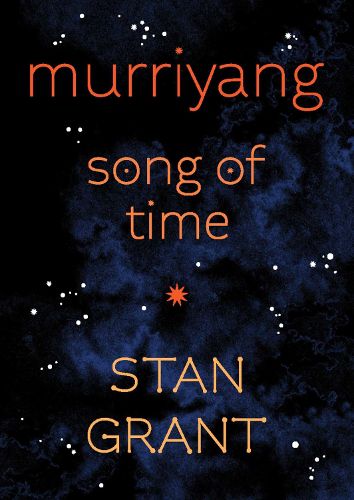Readings Newsletter
Become a Readings Member to make your shopping experience even easier.
Sign in or sign up for free!
You’re not far away from qualifying for FREE standard shipping within Australia
You’ve qualified for FREE standard shipping within Australia
The cart is loading…






Stan Grant is talking to his country in a new way. In his most poetic and inspiring work yet, the Wiradjuri writer offers us a means of moving beyond the binaries and embracing a path to peace and forgiveness rooted in the Wiradjuri spiritual practice of Yindyamarra – deep silence and respect.
Murriyang: Song of Time, in part Grant’s response to the Voice referendum, eschews politics for love. In this gorgeous, grace-filled book, he zooms out to reflect on the biggest questions, ranging across the history, literature, theology, music and art that has shaped him, setting aside anger for kindness, reaching past the secular to the sacred and transcendent.
Inspired by spiritual thinkers and sages from around the world, Grant finds connections with Plato, Saint Augustine, Isaac Newton, jazz saxophonist John Coltrane, Saint Teresa of Avila, Simone Weil, among others. Murriyang is a Wiradjuri prayer in one long uninterrupted breath, challenging Western notions of linear, historical time in favour of Indigenous concepts of deep, circular time – the Dreaming.
Murriyang is also very personal, each meditation interleaved with a memory of Grant’s father – a Wiradjuri cultural leader – and asking how any of us can say goodbye to those we love.
It is a book for our current moment, and something for the ages.
$9.00 standard shipping within Australia
FREE standard shipping within Australia for orders over $100.00
Express & International shipping calculated at checkout
Stock availability can be subject to change without notice. We recommend calling the shop or contacting our online team to check availability of low stock items. Please see our Shopping Online page for more details.
Stan Grant is talking to his country in a new way. In his most poetic and inspiring work yet, the Wiradjuri writer offers us a means of moving beyond the binaries and embracing a path to peace and forgiveness rooted in the Wiradjuri spiritual practice of Yindyamarra – deep silence and respect.
Murriyang: Song of Time, in part Grant’s response to the Voice referendum, eschews politics for love. In this gorgeous, grace-filled book, he zooms out to reflect on the biggest questions, ranging across the history, literature, theology, music and art that has shaped him, setting aside anger for kindness, reaching past the secular to the sacred and transcendent.
Inspired by spiritual thinkers and sages from around the world, Grant finds connections with Plato, Saint Augustine, Isaac Newton, jazz saxophonist John Coltrane, Saint Teresa of Avila, Simone Weil, among others. Murriyang is a Wiradjuri prayer in one long uninterrupted breath, challenging Western notions of linear, historical time in favour of Indigenous concepts of deep, circular time – the Dreaming.
Murriyang is also very personal, each meditation interleaved with a memory of Grant’s father – a Wiradjuri cultural leader – and asking how any of us can say goodbye to those we love.
It is a book for our current moment, and something for the ages.
Stan Grant needs no introduction. When he retired from the ABC in 2023 after a string of racial abuse, just months before the Voice to Parliament Referendum, he said, ‘Don’t mistake [First Nations Australians’] love for weakness – it is our strength. We have never stopped loving and fighting for justice and truth – the hard truths – to speak in our land.’
In Murriyang, this love takes the lead. Grant weaves together stories of his father, prayers to Baiyaame (God), reflections on the Voice, and his love for his Wiradjuri and Kamilaroi communities, to preach a philosophy of love. Politics and reason cannot be enough, Grant argues – we need art, God, poetry. We cannot research physics only because it is useful, but also because it is beautiful; we cannot reduce time to clocks but understand it as eternal; we cannot reduce ourselves to a nation that hates but become a people that love.
Grant here tells a history that is both national and personal. We learn of his mother’s coffee drinking and of Empire. In blurring these categories, Grant suggests that the political cannot be devoid of feeling, and feeling cannot be devoid of the political – this modernist separation fails us. The language of politics is impersonal, but Grant treats all language as personal – his father was tasked with the revival of the Wiradjuri language, which today has hundreds of fluent speakers. He saved the language, kept it alive – how could anything alive be impersonal? With language, there can be memory, with language we create time, with language there can be a voice.
Unfortunately, language does not beget a Voice, and with discussions of the Voice, Grant turns to grace. Gracefully, lyrically, Grant writes like a song, like a prayer: ‘I pray that our worst memories fade. I pray that each rising sun bleaches our scars. I pray kisses number more than tears. I pray silence is peace.’
Delve into fiction, poetry and nonfiction from incredible First Nations Australians.